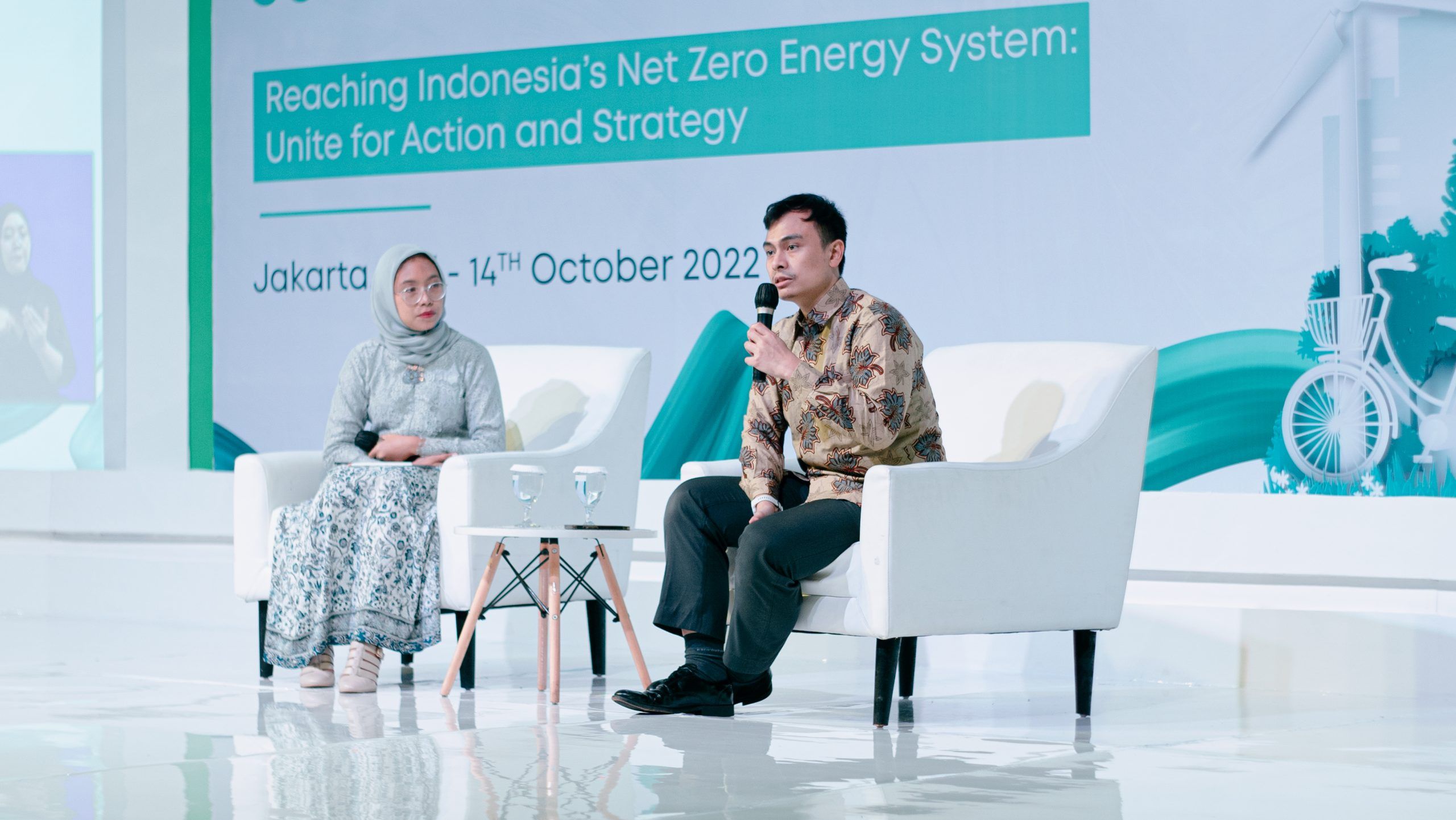
Raditya Wiranegara (right), IESR Senior Researcher, explained the findings of the “Financing Indonesia’s coal phase-out report” at the Indonesia Sustainable Energy Week (ISEW) 2022
Jakarta, 11 October 2022 – The government’s decision in Presidential Regulation (Perpres) 112/2022 to no longer build new coal-fired power plants, and to limit the operation of all coal-fired power plants to 2050 at the latest, needs to be supported by political, financial, and social readiness.
A study by the Institute for Essential Services Reform (IESR) together with the University of Maryland, to comply with the Paris Agreement to limit the increase in average temperature below 1.5 degrees Celsius, Indonesia can immediately retire 4.5 GW of coal-fired power plants within a period 2022-2023.
“The benefits that can be achieved from the early retirement scenario of the coal-fired power plants are about 2-4 times greater than the costs incurred to retire the coal-fired power plants,” said Raditya Wiranegara, Senior Researcher at IESR at Indonesia Sustainable Energy Week (ISEW) 2022.
In addition, he also explained that the accelerated retirement of coal-fired power plants could prevent deaths from reaching 168 thousand people by 2050, and the total health cost savings that could be obtained would be around USD 60 billion by 2050.
Furthermore, Raditya explained that most of the costs needed for coal-fired power plants retirement include the cost of abandoned assets with two-thirds related to the retirement of IPP’s coal-fired power plants.
While waiting for all coal-fired power plants to be fully retired in 2045, Raditya continued, the government can carry out flexible coal-fired power plant operations to make room for renewable energy to enter Indonesia’s energy system.
Koben Calhoun, Principal Carbon Free Electricity, Global South Program, RMI added by citing an IESR study which states that the decarbonization of the energy sector in Indonesia in 2050 will take as much as USD 25 billion/year until 2030 and USD 60 billion/year until 2050 for investment into renewable energy, electrification, and supporting infrastructure.
“Three pillars approach to financing coal transition, recovering capital from the assisting asset and other entities, and refining the existing assets there will be an opportunity to reinvest in clean energy and other tech allowing low carbon power systems and finding support for just energy transition.,” explained Calhoun.
According to him, Indonesia can lead an ambitious energy transition and demonstrate financial mobilization with ambitious government commitments, and leadership towards energy transition platforms and funds has a clear early retirement roadmap preceded by the implementation of pilot projects and has a blended financial structure. finance) to lower capital costs and mobilize finance for the energy transition. Ensuring funding needs as well as the interests and goals of potential investors, who tend to finance renewable energy and no longer want to finance coal projects, are important to be able to open the funding faucet.
Architrandi Priambodo, Senior Energy Specialist at the Asian Development Bank also revealed that early retirement of coal-fired power plants, in addition to significantly reducing greenhouse gas emissions, will also reduce overall generation costs in the long term.
He explained that this is one of the goals of the Energy Transition Mechanism (ETM) program to accelerate the termination or repurposing of coal-fired power plants, especially parts of the power plant assets that can be utilized further, such as transmission and substations.
“In the ongoing ETM feasibility study, financial analysis and transaction structures are also discussed, which include commercial and legal structures to efficiently terminate the coal-fired power plants assets,” said Architrandi.
Melli Darsa, Senior Partner at PwC Indonesia, on the same occasion said that if political conditions are favourable, early retirement plans for coal-fired power plants need to be followed by implementing regulations related to the technical aspects of early retirement for coal-fired power plants to provide higher legal certainty.
“The government has gone in the right direction, in terms of making it very clear that the international commitment is based on strong high-level regulation being on the president’s regulation, the ministers are supposed to go and do a follow up on this. However there is still reluctance of the board to take risks to decide because it might be the right thing, but if there are no clear roles, instead it is assigned,” explained Melli.
ISEW is held in collaboration with the Indonesia Clean Energy Forum (ICEF), the Institute for Essential Services Reform (IESR), and Clean, Affordable, Secure Energy for Southeast Asia (CASE). CASE is a cooperation program between two countries: Indonesia – Germany (Directorate of Electricity, Telecommunications and Information Technology, Ministry of National Development Planning/Bappenas, and funded by the Ministry of Economy and Climate Action of the German Federation Government). Previously, discourse on energy transition in Indonesia was routinely held at the Indonesia Energy Transition Dialogue (IETD), which this year participated in ISEW 2022. First held in 2022, ISEW will last for 5 days from 10-14 October 2022 with the theme Reaching Indonesia’s Net Zero Energy System: Unite for Action and Strategy. All levels of society can participate in this activity for free on isew. live.

